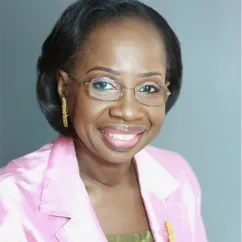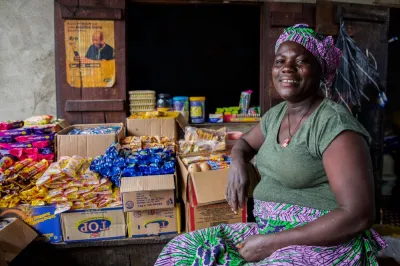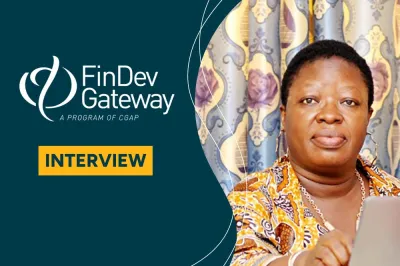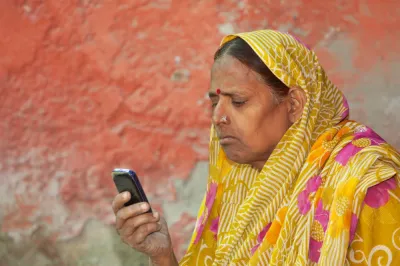Resetting the Mindset Toward Investing in African Women Entrepreneurs

Eveline Tall is the chairperson at E and Partners and former deputy CEO/COO at Ecobank Transnational Inc. She is a distinguished leader in the financial industry, offering insights into the current state of gender investment disparities and the potential for women to drive Africa's economic growth. She is also one of the Ambassadors of the Affirmative Finance Action for Women in Africa (AFAWA).
FinDev Gateway: You have had a long and storied career in financial services in Africa, with 17 years at Citibank and 20 years at Ecobank Group. In your experience, why do you think a program like AFAWA (Affirmative Finance Action for Women in Africa) is necessary?
Eveline Tall: Indeed, I have been in the banking industry for more than three decades. I started my career at Citibank, then joined Ecobank where I reached the highest position a woman has ever held at Ecobank Group, overseeing a balance sheet of around $20 billion.
In all this time as a banker, I must say that I have seen the difficulties that women entrepreneurs face in getting financing. Apart from microfinance, there are not many options available to them in the region. Commercial banks do not have the right solutions to support women entrepreneurs in their financing scope. And microfinance often doesn’t meet their needs when women are ready to scale up and grow their businesses to another level. Lines of credit could help women entrepreneurs, but they need to be better designed with women’s needs and realities in mind, such as greater support or flexibility when it comes to collateral and guarantees. While respecting their credit requirements, banks need to be more innovative in dealing with women entrepreneurs .
These are the reasons AFAWA was launched – to address the unmet financing needs of women entrepreneurs in Africa. The African continent has the highest proportion of women entrepreneurs in the world, with more than a quarter of all businesses being started or run by women. However, women in Africa face an estimated $42 billion financing gap.
Tackling the gender gap in access to finance in Africa
FinDev: What challenges do women entrepreneurs in Africa face in accessing finance?
Eveline: There are multiple, overlapping challenges that women entrepreneurs in Africa face when trying to access finance, but we can group them into three main categories:
Financial institutions’ risk assessments. Women-led small and medium-sized enterprises (WSMEs) are perceived by financial institutions as posing more risk, despite evidence that women are, in fact, more reliable in repaying their loans. WSMEs are also more likely to lack bankable collateral, putting them at greater disadvantage in risk assessments.
Capacity on both sides of the loan. Women entrepreneurs often lack the business and financial skills required by financial institutions to qualify for loans. But what is often overlooked is the capacity gap within financial institutions themselves when it comes to the WSME market. Their lack of experience with and understanding of this market ends up holding women back, keeping them from accessing the financing they need to expand their businesses beyond microfinance levels to become leaders in their industry.
Business environment. In countries across the continent, there are legal and regulatory hurdles that hold WSMEs back from achieving their full potential. For example, five economies in the region—Cameroon, Chad, Equatorial Guinea, Guinea-Bissau and Niger—do not allow women to open a bank account without their husband's permission. Also, access to formal credit relies heavily on asset-based lending. Since women have limited access to property, they are less likely to use it as collateral, putting them at a disadvantage.
What is often overlooked is the capacity gap within financial institutions themselves when it comes to the WSME market.
FinDev: What is AFAWA’s approach to tackling the gender gap in access to finance and liberating women’s entrepreneurial capacity in Africa?
Eveline: AFAWA, which is the flagship initiative of the African Development Bank Group, was created to reduce the financial gap faced by women in Africa. To do this, they are using a three-pillar approach, related to the three main challenges I mentioned. The concept is simple but impactful. The pillars are:
Access to Finance: AFAWA is working with lending institutions across the continent to provide $5 billion in financing for women-led businesses by 2026, leveraging a $250 million risk-sharing instrument managed by the African Guarantee Fund (AGF). So far, the Bank, through the AFAWA initiative, has approved approximately $1.7 billion in cumulative investments and partnered with 96 financial institutions in 32 regional member countries, ultimately supporting more than 7,000 SMEs led or owned by women.
Technical Assistance: Among many other projects, AFAWA is working to boost the professional and financial capacities of over 200 women cooperatives in the staple crop food sector in Côte d’Ivoire. They are also working with Ecobank on a project to support climate-resilient agricultural practices in Ghana, providing financing and technical support to 400 women-led, farmer-based associations and women-owned SMEs.
Enabling Environment: AFAWA is collaborating with African policymakers to support legal, policy and regulatory reforms.
FinDev: How is AFAWA working to change the mindset of the private and public sector towards investing in women entrepreneurs?
Eveline: The AFAWA initiative is not just a financial instrument; it aims to change the narrative and general perceptions, to debunk the myth that WSMEs are risky businesses.
As part of this effort, AFAWA has organized a series of conferences in different countries, including Angola, Ghana, Kenya, Nigeria and Togo, to promote a better understanding of the financing needs of women in Africa. The AFAWA Finance Series conferences include training sessions on how to evaluate products and services through a gender-smart lens to better address women entrepreneurs’ needs. They also aim to facilitate grant funding to women’s business associations, incubators, cooperatives and other organizations with the aim of advancing women’s entrepreneurship.
We need to work together and move faster
FinDev: What is the potential of African businesswomen to drive Africa’s economic growth?
Eveline: Women make up 50% of the population in Africa. However, their skills and expertise are nowhere near adequately represented in the world of business. That needs to change, for the benefit of everyone on the continent. Addressing gender inequalities in Africa could generate an additional $95 billion annually.
The good news is that Africa is undergoing a fundamental reset in mindset toward investing in its women entrepreneurs. We are seeing positive change, but it is essential to work together and move faster toward closing the gender and financing gap that women in Africa currently face.
FinDev Interview
About this interview
Published
Contributed by a global financial inclusion community member. Share your lessons learned
Write for usComments
Comments on this page are moderated by FinDev Editors. We welcome comments that offer remarks and insights that are relevant to the post. Learn More



Good initiative. Asian region, particularly India, Nepal and Pakistan also need women led access to finance program because gender disparities is high in these countries.
Leave a comment